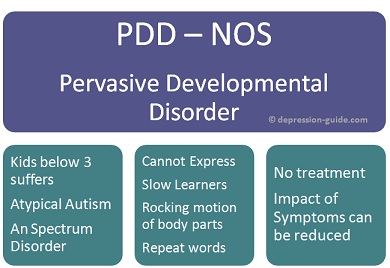Pervasive Developmental Disorder - Not Otherwise Specified (PDD-NOS)
TweetThe PDD-NOS is one among the three types of behavior disorder in the Autism Spectrum Disorders. It also belongs to another category of disorders known under the PDD bucket of 5 disorders.
A child is diagnosed with PDD-NOS they display some symptoms or behavior of Autistic Disorder, but the full set of symptoms of Autism is missing.
The symptoms also vary from child to child. These symptoms are often mild and there are very few and less frequent behavior related issues from these children in school and at home. There are still some children who experience more severe form of illness which can impact them in all aspects of life.
PDD-NOS is sometimes also known as atypical autism. In this illness, the criteria for autistic disorder are not present. For example, the start of the disease is late in age, etc. PDD-NOS are considered to be milder in terms of severity of symptoms. This is not true at all times since some symptoms are milder (majority) while few symptoms are more severe as compared to typical autism.
Since the typical onset of the illness is before the age of 3 years, it is also categorized as a growth or development disorder. A lot of times, the illness starts before 3 and parents do not notice them until the child is toddler. They compare the child with other children of same age and realize that there is issue with these child.
Symptoms of Pervasive Developmental Disorder - Not Otherwise Specified
A child is monitored and judged for presence of PDD-NOS if the child show some autistic behavior but do not meet the whole set of criterion for Autism or Autistic behavior.
The symptoms also vary from child to child. The particular symptoms are sometimes severe in some children. While some other symptoms are common in other children. The presence of symptoms can also vary from the severity of PDD-NOS.

Typical Symptoms of Pervasive Developmental Disorder - NOS
Children with PDD-NOS can show some of the below mentioned symptoms with varying severity and degree.
- These children are not open and cannot express or understand the feelings within them.
- They are slow learners in speech and language.
- They have tendency to repeat words.
- Repeat words or phrases again and again (echolalia).
- Minor changes upsets the mind and they shell out unrelated answers for all the questions. Becomes obsessive by nature and hobbies.
- Perform rocking motion with hands, body, legs etc. They can't respond to their name calls even at 12 months of age.
- They want to be alone and avoid eye contact.
Treatment options for Pervasive Developmental Disorder - NOS
There is no treatment which can cure the illness of PDD-NOS. The affected children respond to the combination of treatments rather than a single treatment. Few of the challenges which can be good for the kids are ABA, play therapy, social skills training, sensory integration therapy, etc. You should refer to your doctor and he can discuss the recovery and treatment plan for your child. You can participate in the therapy classes as a volunteer as well.


Sometimes crying or laughing
are the only options left,
and laughing feels better right now.

Current Issue
 Self Help Leaflets Take the help of our self help leaflets or booklets. |
 The DG Magazine All about living with depression |
Know more on Autism
- Autism Spectrum Disorders
- Autism Symptoms and Early Signs
- Autism Rating Scale
- Helping Children with Autism
- Repetitive Behavior
- Autism
- Autism in Early Years
- Autism Friendly Environment
- Bullying and Autism
- Living with Autism
- PDD - NOS
- Myths Facts and Statistics of Autism
- A guide for adults
- Can Autism be prevented?
- Speech problem with autism
- Autism and Ageing
- Medication for autism
- Treatment
- History
- Diagnosis
- Conditions associated with autism
- Sibling
- Autism and Stress
- Facts and Statistics
- How to Choose the Right School for Your Child With ASD












